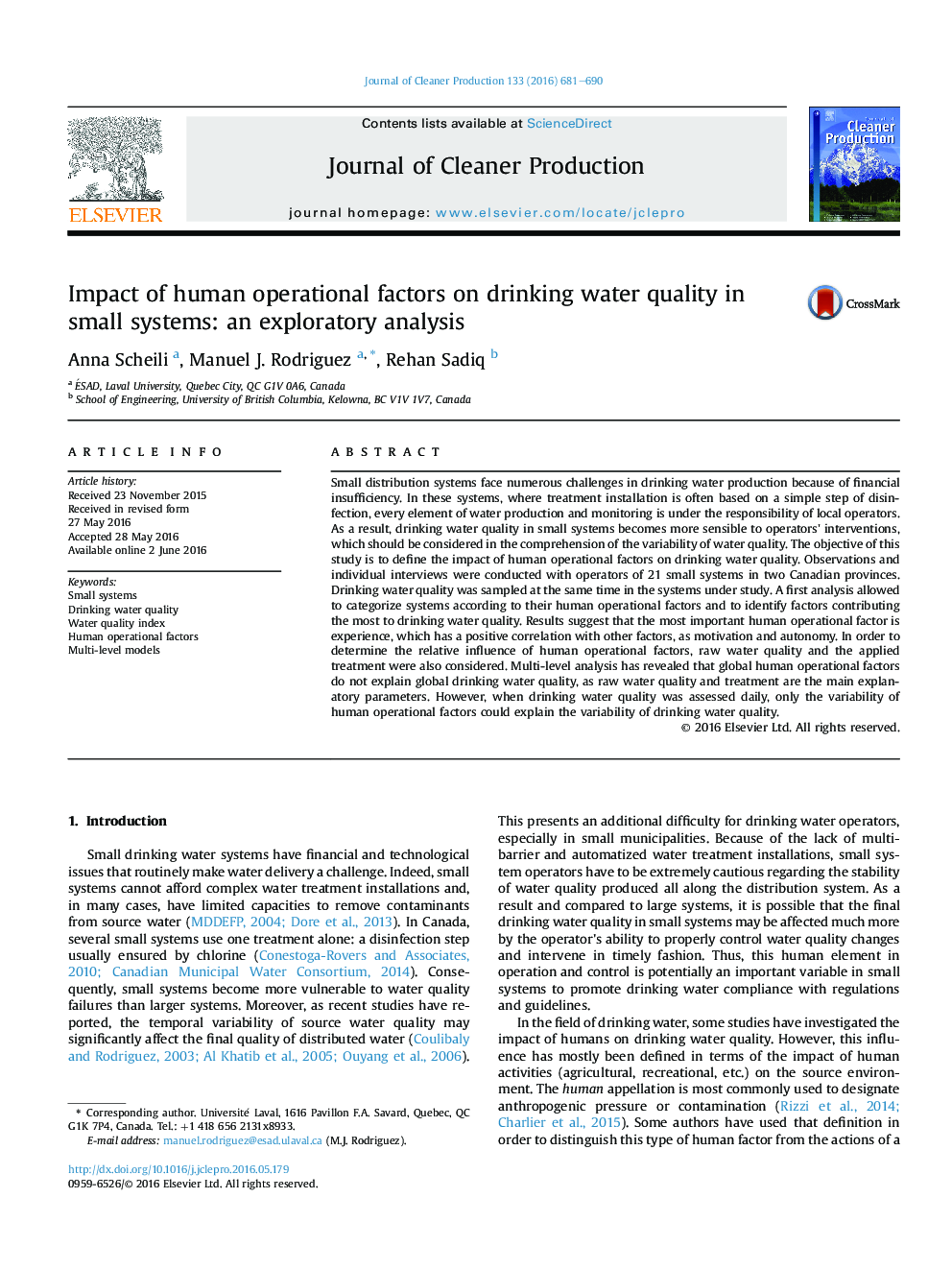| کد مقاله | کد نشریه | سال انتشار | مقاله انگلیسی | نسخه تمام متن |
|---|---|---|---|---|
| 8101792 | 1522116 | 2016 | 10 صفحه PDF | دانلود رایگان |
عنوان انگلیسی مقاله ISI
Impact of human operational factors on drinking water quality in small systems: an exploratory analysis
ترجمه فارسی عنوان
تأثیر عوامل عملیاتی انسان بر کیفیت آب آشامیدنی در سیستم های کوچک: یک تجزیه و تحلیل اکتشافی
دانلود مقاله + سفارش ترجمه
دانلود مقاله ISI انگلیسی
رایگان برای ایرانیان
کلمات کلیدی
سیستم های کوچک کیفیت آب آشامیدنی، شاخص کیفیت آب، عوامل عملیاتی بشر، مدلهای چندسطحی،
ترجمه چکیده
سیستم های توزیع کوچک به علت کمبود مالی در تولید آب آشامیدنی با چالش های متعددی روبرو هستند. در این سیستم ها، که در آن نصب و راه اندازی درمان اغلب بر اساس یک گام ساده از ضد عفونی، هر عنصر تولید و نظارت بر آب مسئولیت اپراتورهای محلی است. در نتیجه، کیفیت آب آشامیدنی در سیستم های کوچک، برای اقدامات اپراتورها بیشتر قابل درک است، که باید در درک تغییرات کیفیت آب در نظر گرفته شود. هدف از این مطالعه تعریف تاثیر عوامل عملیاتی انسان بر کیفیت آب آشامیدنی است. مشاهدات و مصاحبه های فردی با اپراتورهای 21 سیستم کوچک در دو استان کانادایی انجام شد. کیفیت آب آشامیدنی در همان زمان در سیستم های مورد مطالعه نمونه گیری شد. تجزیه و تحلیل اول اجازه می دهد به طبقه بندی سیستم با توجه به عوامل عامل انسانی خود و به شناسایی عوامل که بیشتر به کیفیت آب آشامیدنی. نتایج نشان می دهد که مهمترین عامل عامل انسان، تجربه است که همبستگی مثبت با عوامل دیگر، به عنوان انگیزه و استقلال دارد. به منظور تعیین تأثیر نسبی عوامل عملیاتی انسان، کیفیت آب خام و کاربرد کاربردی نیز مورد توجه قرار گرفت. تجزیه و تحلیل چندسطحی نشان داده است که عوامل عملیاتی انسانی جهانی، کیفیت آب آشامیدنی جهانی را توضیح نمی دهند، زیرا کیفیت آب خام و درمان اصلی پارامترهای تبعیض آمیز هستند. با این حال، هنگامی که کیفیت آب آشامیدنی روزانه ارزیابی می شود، تنها تنوع عامل های عامل انسان می تواند تغییرات کیفیت آب آشامیدنی را توضیح دهد.
موضوعات مرتبط
مهندسی و علوم پایه
مهندسی انرژی
انرژی های تجدید پذیر، توسعه پایدار و محیط زیست
چکیده انگلیسی
Small distribution systems face numerous challenges in drinking water production because of financial insufficiency. In these systems, where treatment installation is often based on a simple step of disinfection, every element of water production and monitoring is under the responsibility of local operators. As a result, drinking water quality in small systems becomes more sensible to operators' interventions, which should be considered in the comprehension of the variability of water quality. The objective of this study is to define the impact of human operational factors on drinking water quality. Observations and individual interviews were conducted with operators of 21 small systems in two Canadian provinces. Drinking water quality was sampled at the same time in the systems under study. A first analysis allowed to categorize systems according to their human operational factors and to identify factors contributing the most to drinking water quality. Results suggest that the most important human operational factor is experience, which has a positive correlation with other factors, as motivation and autonomy. In order to determine the relative influence of human operational factors, raw water quality and the applied treatment were also considered. Multi-level analysis has revealed that global human operational factors do not explain global drinking water quality, as raw water quality and treatment are the main explanatory parameters. However, when drinking water quality was assessed daily, only the variability of human operational factors could explain the variability of drinking water quality.
ناشر
Database: Elsevier - ScienceDirect (ساینس دایرکت)
Journal: Journal of Cleaner Production - Volume 133, 1 October 2016, Pages 681-690
Journal: Journal of Cleaner Production - Volume 133, 1 October 2016, Pages 681-690
نویسندگان
Anna Scheili, Manuel J. Rodriguez, Rehan Sadiq,
